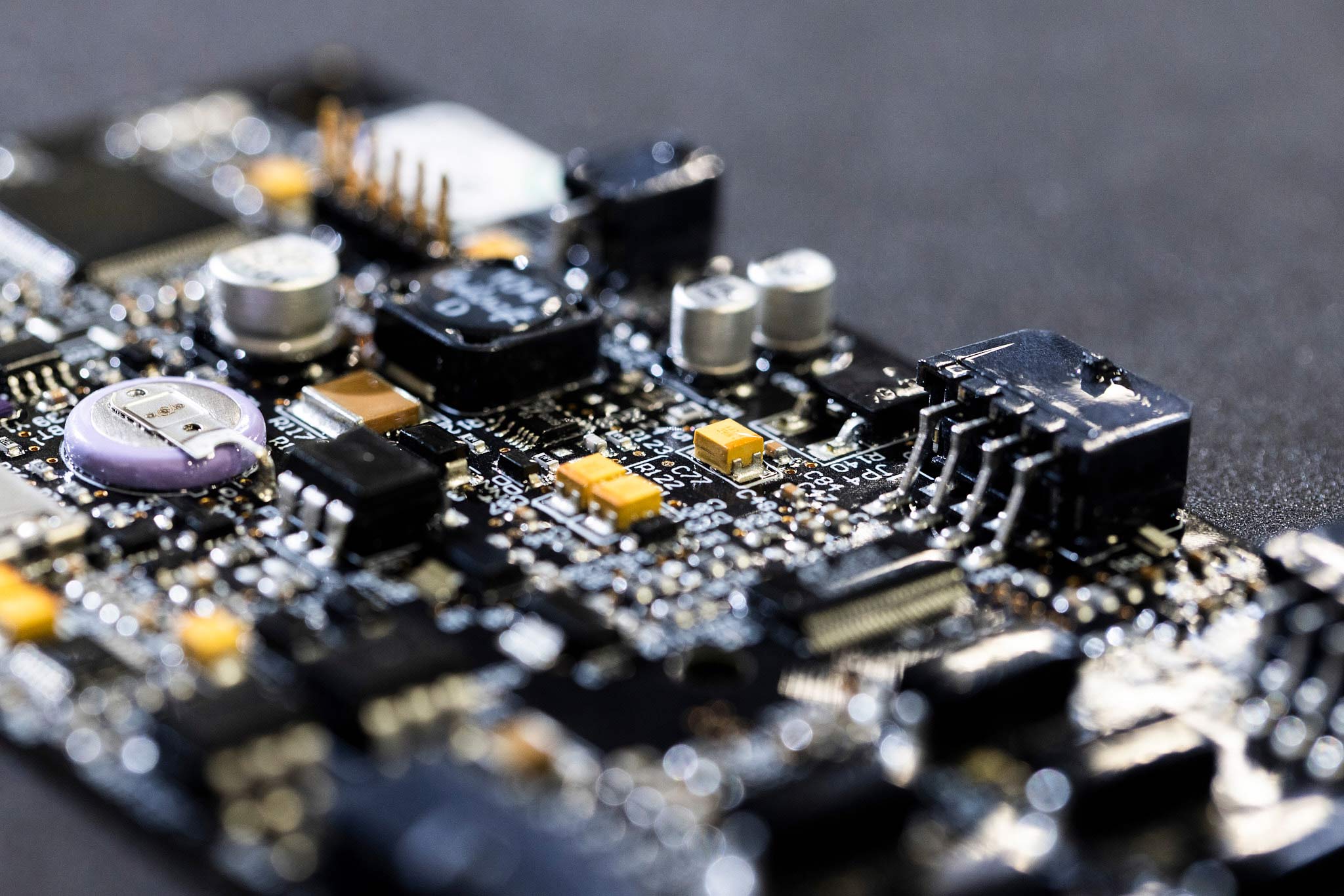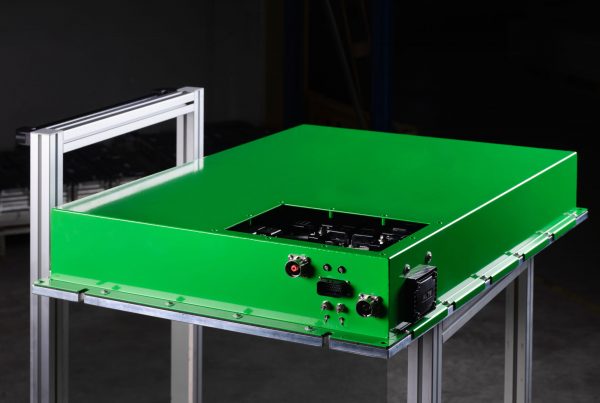How Many Types of Lithium Batteries Exist?
Lithium batteries are now one of the fundamental pillars for technological progress across various sectors, from sustainable mobility to industrial applications, as well as energy efficiency and nautical use. But what do we really know about these accumulators that power our electric vehicles, electronic devices, and even boats? And most importantly, how many types of lithium batteries exist, and what are their unique features? In this article, we will explore the different types of lithium batteries, analyzing their main characteristics, advantages and disadvantages, and ideal contexts for use. Together, we will discover which solution might be the most suitable for specific needs, whether it’s for an electric car, a home energy storage system, or an industrial application.
What is a Lithium Battery and how does it work?
Lithium batteries are electrochemical devices capable of storing and releasing electrical energy through the movement of lithium ions between the anode and the cathode. These accumulators are known for their high energy density, allowing them to store large amounts of energy in relatively small spaces, and for their efficiency in terms of lifespan and charge/discharge cycles. The operation of a lithium battery is based on the principle that during charging, lithium ions move from the anode to the cathode through the electrolyte, and vice versa during discharge. This process generates an electric current flow that can be used to power various devices.
Lithium accumulators are distinguished by their ability to maintain a constant voltage throughout almost the entire discharge process, making them ideal for applications that require stability and reliability. However, there are various chemical formulations that differ in terms of energy density, safety, cost, and lifespan. Now, let’s see why there are so many variants and what the main differences between them are.
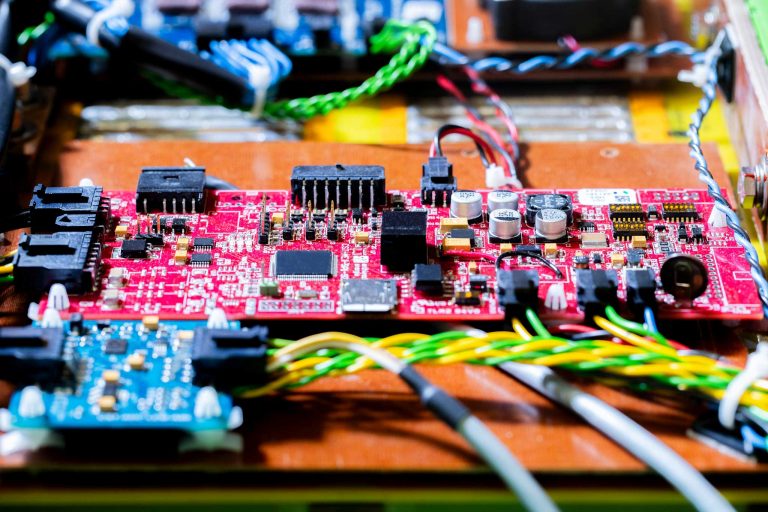
Why are there different types of Lithium Batteries?
There are numerous types of batteries, which differ in terms of cell components such as electrolyte, anode, and cathode. Different types of batteries have different operational temperature ranges, manufacturing costs, specific energy values (energy content per weight), specific power values (load capacity), efficiency, lifecycle, and durability. An important goal in the development of battery technology is to improve these values to meet the specific needs of various sectors and applications. For instance, batteries used in portable electronic devices need to be lightweight and compact, while those for electric cars must offer a high number of charge cycles and ensure maximum safety. In this context, Archimede Energia has developed advanced solutions that cover a wide range of applications, from sustainable mobility to industrial applications, as well as energy efficiency and the nautical sector.
Let’s now take a closer look at the main types of lithium batteries available on the market and their distinctive characteristics.
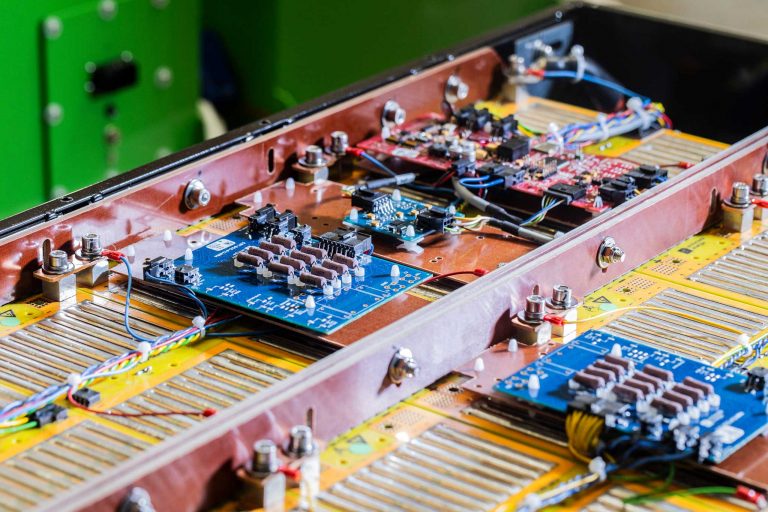
The main types of Lithium Batteries available on the market
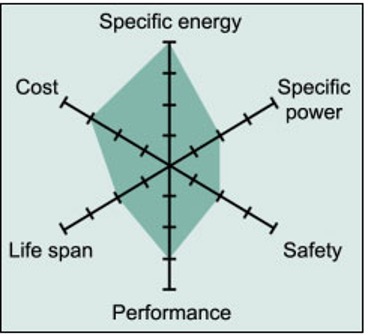 Lithium-Ion Batteries (Li-ion)
Lithium-Ion Batteries (Li-ion)
Lithium-ion batteries, commonly known as Li-ion, are among the most widely used. In Li-ion batteries, lithium ions (Li+) switch between the anode and cathode through an electrolyte and a porous separator. Their high energy density makes them ideal for electronic devices such as smartphones, laptops, and tablets. They are lightweight and have a low self-discharge rate, meaning they can maintain their charge for long periods when not in use. However, these batteries can present safety issues if not managed correctly, as they are sensitive to overheating and can catch fire if damaged or misused.
Advantages of Li-ion Batteries:
- High energy density
- Lightweight
- Low self-discharge
Disadvantages of Li-ion Batteries:
- Sensitive to overheating
- Higher cost compared to other technologies
- Limited lifespan compared to other types
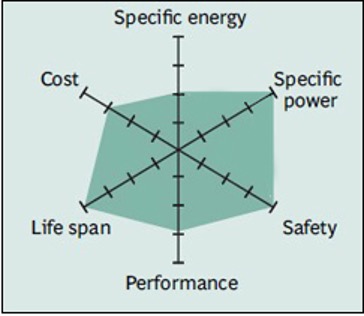 Lithium Iron Phosphate Batteries (LiFePO4)
Lithium Iron Phosphate Batteries (LiFePO4)
Lithium iron phosphate (LFP) batteries are distinguished by their exceptional safety, thermal stability, and long lifespan, making them particularly suitable for industrial, automotive, and energy storage applications. Although they have a lower energy density compared to other technologies, such as Li-ion batteries, they offer the advantage of withstanding a very high number of charge and discharge cycles, often exceeding 3,500 cycles. Even after these cycles, they maintain about 80% of their capacity, allowing reuse in other applications, such as energy storage.Another key feature of LFP batteries is their flat discharge curve, which ensures consistent performance throughout their usage cycle, ideal for vehicles and industrial machines. Due to their intrinsic safety and stability in large-capacity formats, these batteries are particularly used in areas such as automation, robotics, logistics, agriculture, nautical, and electric vehicles, where safety and longevity are priorities. Companies like Archimede Energia adopt LFP technology to ensure reliability and safety in their products aimed at these areas.
Advantages of LiFePO4 Batteries:
- High safety and thermal stability
- Long lifespan
- Low environmental impact
Disadvantages of LiFePO4 Batteries:
- Lower energy density
- Heavier than Li-ion batteries
- Higher initial cost
Lithium Polymer Batteries (Li-Po)
Lithium polymer (Li-Po) batteries are a variant of Li-ion batteries that use a gel-like electrolyte instead of a liquid one. This makes them more flexible in terms of shape and size, allowing greater design freedom. They are often used in applications where space and weight are critical factors, such as drones, models, and portable electronic devices. However, they have a more fragile construction.
Advantages of Li-Po Batteries:
- Design flexibility
- Lightweight
- Good energy density
Disadvantages of Li-Po Batteries:
- Sensitive to physical damage
- Lower lifecycles compared to other
- Higher production cost
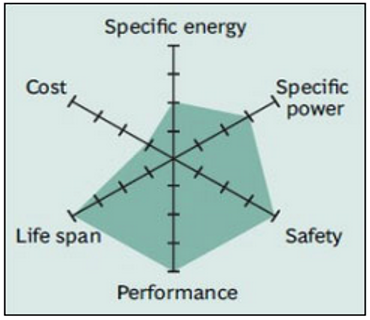 Lithium Titanate Batteries (Li4Ti5O12)
Lithium Titanate Batteries (Li4Ti5O12)
Lithium titanate (LTO) batteries use a titanium oxide anode, which gives them greater safety and exceptional resistance to rapid charge cycles. They can be charged in much shorter times compared to other technologies and have an extremely long lifespan. They are ideal for applications that require high power and speed of charge/discharge, such as automated guided vehicles (AGVs) that need a high number of cycles and fast charging times.
Advantages of LTO Batteries:
- Very fast charge/discharge times (6C/10C)
- Long lifespan
- Excellent safety
Disadvantages of LTO Batteries:
- Lower energy density
- High production costs
- Limited applications due to size and weight
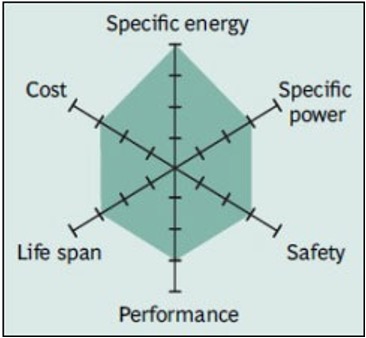 Nickel Manganese Cobalt Lithium Batteries (LiNxMnyCozO2)
Nickel Manganese Cobalt Lithium Batteries (LiNxMnyCozO2)
Nickel manganese cobalt (NMC) batteries are the most widely used in the automotive sector. They offer very high energy density and relatively fast charging times. However, the use of cobalt makes this chemistry costly and problematic from an ethical and environmental standpoint. For these reasons, the industry is exploring solutions like NMX batteries, which aim to reduce or eliminate cobalt without compromising performance; for this purpose, the ratios of the materials used are specified in the names of these batteries:
- NMC 111: Composition 1:1:1
- NMC 532: Composition 5:3:2
- NMC 622: Composition 6:2:2
- NMC 811: Composition 8:1:1
Advantages of NMC Batteries:
- High energy density
- Good cycle life
- Chemical versatility
Disadvantages of NMC Batteries:
- High cobalt cost
- Ethical and supply issues
- More sensitive to thermal fluctuations than other chemistries
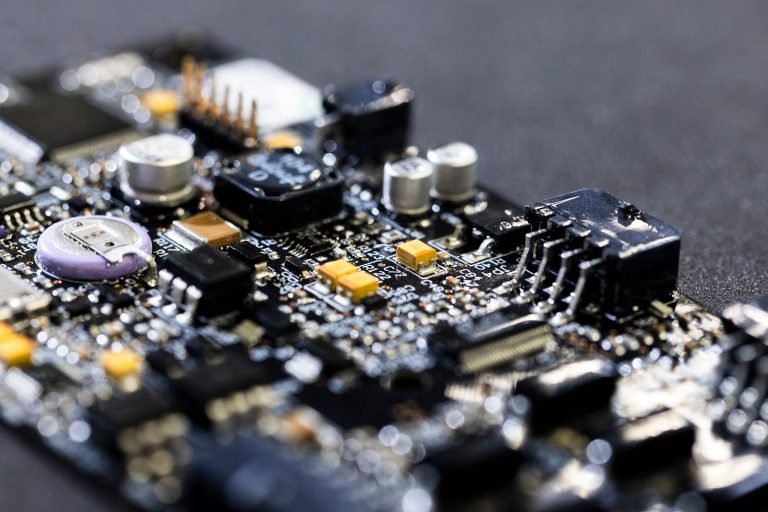
Applications and uses of different types of Lithium Batteries
Home and Industrial Energy Storage Systems
Energy storage systems are crucial for maximizing renewable energy sources such as solar and wind. Lithium batteries, particularly LFP and NMC, are used to store energy produced during the day for release when needed, such as at night or during peak consumption periods. Archimede Energia develops advanced energy storage solutions designed to ensure reliability and safety in both home and industrial settings. LiFePO4 batteries, with their long lifespan and thermal stability, are particularly suitable for these systems, while LTO batteries offer the possibility of rapid recharging and exceptional longevity.
Automotive Sector
In the automotive sector, lithium batteries, particularly LiFePO4 and NMC, have revolutionized the concept of sustainable mobility. Electric and hybrid cars rely on these technologies to guarantee increasingly higher ranges, safety, and reliability. Archimede Energia offers advanced solutions for electric vehicles, focusing on battery longevity and safety—crucial elements for this rapidly evolving industry.
Consumer Electronics
In the field of consumer electronics, Li-ion batteries reign supreme thanks to their lightweight and ability to store energy in small spaces. Smartphones, tablets, laptops, and many other portable devices depend on this technology to ensure hours of autonomy and high performance. Li-Po batteries, with their design flexibility, find extensive use in more compact devices with irregular shapes, such as smartwatches, drones, and wearables. Their lightweight and versatility make them perfect for applications where space is limited and weight is a critical factor.
Special applications and the future of Lithium Batteries
Lithium batteries are also applied in more specific contexts, such as nautical and aerospace. Electric and hybrid vessels, for example, require batteries that can withstand harsh environmental conditions and ensure long autonomy. Archimede Energia is developing innovative solutions that use LiFePO4 and LTO batteries to ensure reliable performance in marine conditions. In the aerospace sector, lithium-sulfur (Li-S) batteries could represent the next revolution, thanks to their high energy density and reduced weight, making them ideal for applications where every gram counts.
The future of lithium batteries is extremely promising: current research is focused on further increasing energy density, improving safety, and reducing production costs. New technologies, such as lithium-air (Li-air) and lithium-metal batteries, are in development and could further revolutionize the energy landscape.
How to choose the right type of Lithium Battery for your needs
Choosing the right type of lithium battery depends on several factors, including the specific application, budget, longevity and safety needs, and operating conditions. For example, a LiFePO4 battery can be an excellent choice for an electric vehicle that requires a long range and high safety. For portable electronic devices, Li-ion or Li-Po batteries offer the best balance between lightness and energy capacity. For applications that need rapid charge cycles and durability, such as stationary storage systems, LTO batteries are an optimal solution.
Factors to Consider When Choosing a Lithium Battery:
- Energy Density: How much energy the battery can store within a given volume or weight.
- Safety: The battery’s ability to withstand extreme conditions without the risk of fire or explosion.
- Lifespan: The number of charge and discharge cycles the battery can endure before losing capacity.
- Cost: The price of the battery relative to its performance and expected lifespan.
- Recharge Time: How quickly the battery can be fully recharged.
Lithium batteries have become a fundamental component of our daily lives and the transition to a more sustainable energy future. The variety of available types allows for specific solutions across diverse sectors, from consumer electronics to sustainable mobility and industrial and marine applications. Understanding the features and specifics of different types of lithium batteries is essential for choosing the most suitable solution for your needs.
Archimede Energia is at the forefront of developing innovative and reliable lithium-based solutions, offering a range of products covering multiple applications that ensure safety, efficiency, and sustainability. Whether you are looking for a battery for an electric vehicle, an energy storage system, or an industrial solution, Archimede Energia has the right answer for you.
Choosing the right battery can make a substantial difference in terms of performance and system longevity. With continuous technological advancements, the future of lithium batteries looks increasingly promising, bringing innovations that will radically transform our approach to energy and sustainability.
Contact us for more information about our services and products.


